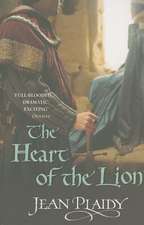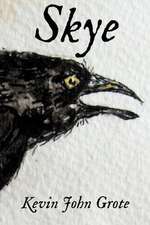The Malice of Fortune: A Novel of the Renaissance
Autor Michael Ennisen Limba Engleză Paperback – 3 iun 2013
However, a string of gruesome murders have left Imola’s residents too gripped by fear to help a lone woman. Enlisting the aid of the obscure Florentine diplomat Niccolò Machiavelli and the eccentric military engineer Leonardo da Vinci, Damiata sets off to decipher the killer’s taunting riddles: she with her street smarts, Leonardo with his groundbreaking “science of observation,” and Machiavelli with his new “science of men.”
Preț: 92.30 lei
Nou
Puncte Express: 138
Preț estimativ în valută:
17.67€ • 18.21$ • 14.83£
17.67€ • 18.21$ • 14.83£
Carte indisponibilă temporar
Doresc să fiu notificat când acest titlu va fi disponibil:
Se trimite...
Preluare comenzi: 021 569.72.76
Specificații
ISBN-13: 9780307951045
ISBN-10: 0307951049
Pagini: 396
Ilustrații: 8 b&w illustrations
Dimensiuni: 138 x 200 x 21 mm
Greutate: 0.38 kg
Editura: Anchor Books
ISBN-10: 0307951049
Pagini: 396
Ilustrații: 8 b&w illustrations
Dimensiuni: 138 x 200 x 21 mm
Greutate: 0.38 kg
Editura: Anchor Books
Notă biografică
Michael Ennis taught art history at the University of Texas, developed museum programs as a Rockefeller Foundation Fellow, and worked as an independent curator and consultant. He is the author of two historical novels, The Duchess of Milan and Byzantium. He has written for Esquire and Architectural Digest, and is a regular contributor to Texas Monthly. He lives in Dallas with his television producer wife, Ellen, and their daughter, Arielle.
Extras
Excerpted from the Hardcover Edition
Chapter 1
My dearest, most darling Giovanni,
We lived in two rooms in the Trastevere. This district of Rome lies across the Tiber from the old Capitol Hill, on the same side of the river as the Vatican and the Castel Sant’Angelo. Gathered around the Santa Maria church, the Trastevere was a village unto itself, a labyrinth of wineshops, inns, tanneries, dyers’ vats, and falling-down houses that were probably old when Titus Flavius returned in triumph after conquering Judea; many of the Jews who lived there claimed to be descended from his captives. But our neighbors came from everywhere: Seville, Corsica, Burgundy, Lombardy, even Arabia. It was a village where everyone was different, so no one stood out.
Our rooms were on the ground floor of an ancient brick house off a narrow, muddy alley, with little shops and other houses crowding in on every side, their balconies and galleries so close overhead that we always seemed to go out into the night, even at noon. I kept my books and antique cameos hidden, displaying nothing that might tempt a thief—or reveal who I had formerly been. But we whitewashed the walls once a year and always swept the tiles, and you never slept on a straw mattress but always on good cotton stuffing; there was never a day we didn’t have flowers or fresh greens on our tiny table—or wanted for bacon in our beans.
In the evening, before you slept and I went out, I would read Petrarch to you or tell you stories. That was what we were doing on our last night together—19 November, anno Domini 1502. I showed you this bronze medallion stamped with a portrait of Nero Claudius Caesar, about whom I recited tales I had read in Tacitus when I was little more than a girl. Hearing of his crimes, you gave Signor Nero a very stern look and wagged your finger at his engraved visage, telling him, “Even an emperor does not have lice . . . lice . . .”
“An emperor does not have lice?” I asked, which made you frown like a German banker, so I said, “I think the word you are reaching for is license.”
“Sì, Mama, license. Even an emperor does not have license to be so evil.” Your sweet cricket voice was so grave. “Therefore, we shall punish Signor Nero. No dessert! His sugared almond will be given to Ermes.”
Do you remember Ermes, my eternal love? He was our darling Tenerife, who adored you as much as you adored him. When you said his name he wiggled his woolly rump and lapped at your precious hand with his little pink tongue.
Camilla sat on the bed with us, sewing patches on her skirt. She was my dearest friend and most devoted servant, who took you on a journey to the piazza in front of Santa Maria every day, when I could not go out, and slept next to you every night, when darkness freed me to do my business. Your zia Camilla was not your real auntie, but she was my sister in everything but blood, and if one day I did not come home, I trusted her to keep you safe and see that you became a man. Thin as a birch and taller than I am, our sweet Camilla had a pale, grave face, her eyes and mouth dark smudges, which made her seem like a lovely ghost, though she was as strong as a Turk wrestler. She was born in Naples, and nature made her hair as raven-hued as I dye mine now.
I could describe every detail of that tiny room in the Trastevere, my most adored and most precious son, yet I could never describe the love that surrounded you there. And now I have no greater fear than that we will become separated by an ocean of time, which no words can cross.
Perhaps all you will remember of me is that I did not come back for you.
♦
An old Jew named Obadiah lived next door to us, above a noisy wineshop. He was a divine man, scarcely tall enough to look through a keyhole, who loved to discuss the works of Flavius Josephus and often arranged for me to purchase antiquities from dealers and cavatori—diggers—of his acquaintance. So when I heard the pounding on our ancient oak door, it was not at all remarkable to find Obadiah there, although I was surprised at his urgency. His face was always like a marvelous drawing on old parchment, all the lines carefully marked in sepia ink. Yet as I looked down at him peering around the side of our door, that yellowed parchment seemed to bleach out in an instant.
The three men were in our house even before poor Obadiah could sag and fall to the ground; they made certain we saw their saber and stilettos. But you weren’t frightened, nor was Ermes, who rushed at them even before you did, barking like a woman screaming until the man with the saber swatted him with his blade and our precious dog flew against the wall like a bundle of wool. A heartbeat later you collided with this man’s legs and at once he clapped his hand to your mouth and directed the tip of his blade at your little belly. The invaders had entered without a word, but now this man, who had only one seeing eye—the other was like a poached egg—said with a coarse Neapolitan accent, “We’ll slit the boy like a November hog.”
I wanted to say, “I don’t believe the man who sent you will permit you to kill his grandson.” But if your grandfather had sent these men, he was very shrewd, because they sufficiently resembled common thieves that I could not be certain they weren’t. So I had to say, “I’ll show you where my things are.”
The second man came around behind me and shoved the wooden gag in my mouth; it is a miracle he did not knock out my teeth. He tied the leather cord behind my head so tight that the knot felt like the butt of a knife jammed into my skull. The wood sucked all the moisture from my tongue and I could only watch as the third man gagged Camilla. I will never forget the look in her eyes just before he pushed her down on the mattress.
The one-eyed man had started out the door with you, clutching you to his breast, you kicking and flailing until he said, “Do you want me to kill your mama?” Though you were not even five years old, you were clever enough to at once cease your protest. And by then you could see the body of dear old Obadiah lying outside our door, his shirt sopping with blood as red as a cardinal’s hat. He had died trying to warn us.
For my part, I bolted to the door, preferring to perish in pursuit of you than share our beloved Camilla’s fate. I was not forced back into the room; after the second man grabbed me by the hair, he proceeded to drag me alongside you and his accomplice, pricking his knife into my ribs whenever I struggled. The flock of chickens that roosted on the balcony next door clucked and chortled as we passed beneath them.
♦
It did not take us long to arrive at your grandfather’s residence, even though we circled around the back. As we came up through the garden mazes, the basilica and palazzo rose like mountains above us, lamps flickering in dozens of windows. Within moments we were inside that great edifice, glimpses of gilded furniture and new frescoes rushing past, the brightly colored patterns of the tapestries and Oriental rugs flying at me like confetti at Carnival. The entire establishment reeked of pleasure: smoldering censers, fresh orange and rose water, roasted meats, musk, wax candles, and spilled wine.
Halfway through our passage two more men, hooded like monks, took you from your one-eyed captor. I could say nothing to you in farewell, merely issuing terrible, strangled sounds that nearly choked me, until I thought a merciful God would take me away. But of all the dwellings in this sinful world, our Immaculate Lord is least present in the house where you and I had just become captives.
Light from an open doorway burst before me, as brilliant as fireworks. Laughter leapt out at me as mercilessly as Caesar’s assassins when he entered the senate. The room I was shoved into was the big sala reale, most of the floor transformed into a forest of brass lampstands. In a scene our Dante never thought to invent, two dozen or so women, on their hands and knees, crawled like pigs rooting for acorns, bare breasts swaying and naked white bottoms quivering, some squatting in an effort to retrieve the prizes—chestnuts—strewn upon the Turkish carpets. In accordance with the rules of the house, they were not allowed to use their hands or mouths—or even their toes.
The master of that evening’s quaint ceremony was your grandfather, Rodrigo Borgia, though the rest of Christendom calls him il papa: Pope Alexander VI. His Holiness was seated upon the raised wooden dais, behind a table covered with cloth of gold, the saltcellars arrayed atop it in a symposium of miniature gold and silver gods and goddesses. The silvered sugar desserts, in the shapes of deer, dolphins, unicorns, and lions, crawled among the little deities like the disgorged cargo of some confectionary ark.
As I was dragged toward the master of the house, the men at the table stared with eyes reddened from the smoke, not a jacket remaining on anyone—they were down to shirts and hose, or breeches, all those bald or tonsured heads glistening. Your grandfather’s white silk shirt was so wet that it had become a milky membrane, clinging to his great chest and sagging old-man’s breasts. His skull gleamed like a brass bowl, the rim of this vessel a fringe of gray-tipped chestnut hair that fell over his ears. I had not seen him in five years, but it was as if that time had been only an illusion.
Leaning back in his immense gilt chair, he offered me his scrutiny, his pupils as black and empty as the holes drilled in a marble bust. He tilted his head slightly, his magnificent predator’s beak pointing the way back out.
♦
I did not have to be carried far, just around two corners. Once we entered your grandfather’s apartments, I even knew precisely which of these lavishly frescoed rooms would witness my travail. Called the Hall of Saints, it was empty save for a few chairs and sideboards; in the center remained a brazier, a small intarsia table, and a single armchair, upholstered in scarlet velvet embroidered with little gold bulls, the symbol of your family.
Once I was tied upon this throne, I quickly received my first visitor, your grandfather’s master of artillery, Lorenzo Beheim—he of the treatises on dark magic and procedures to summon Satan. Beheim carried a wooden box such as physicians haul about. Placing this item on the table beside me, he opened it so that I could admire instruments that indeed looked like those used to explore the womb and extract a reluctant infant—tongs, hooks, picks, and pliers. As he brought the brazier closer, no doubt for his convenience when heating these devices, the reek of burning charcoal invaded my nostrils.
Having completed these preparations, he left.
Yet I was not entirely alone. The upper walls all around me were framed by massive gilded arches, and the painter Pinturicchio had filled each of the half-moon-shaped lunettes with tales of saints, their legends portrayed as extravagant ceremonies teeming with spectators. My chair had been placed so that I could look up at the lunette opposite the window, upon which the enormous Disputation of Saint Catherine of Alexandria had been painted in gorgeous peacock hues.
This view allowed me to renew my acquaintance with some of your grandfather’s bastards. You see, Pinturicchio used all sorts of people at your grandfather’s court as models for the characters in this tale, though in the short years since he finished his labor, time and Fortune had altered so much about them. At the center of this glorious pageant was Saint Catherine, presenting her defense of the Christian faith to the Emperor Maximinus and his colloquy of scholars. Saint Catherine was a perfect likeness of your aunt Lucrezia, the present Duchess of Ferrara, her hair falling in flaxen waves, her puckered mouth as red as a cherry, her cerulean gaze fixed on a dream. This portrait was more real than life, because when I knew Lucrezia, if ever she was caught in a momentary thought, she would at once show her perfect teeth, a smile intended to draw one’s attention from the desperate hope in her eyes.
In my worst fears, my darling, you have come to know Lucrezia’s expression; but if this is so, then perhaps you have an image in an imperfect mirror of your mama. Because it was often said, in those years when I was familiar with your family, that I looked enough like Madonna Lucrezia to be her older sister. I never thought so; your aunt’s nose was smaller, her forehead less broad, her eyes a lighter tint. But perhaps now I share with your aunt Lucrezia the same sorrowful hope.
No less real than Lucrezia’s portrait were the two figures at opposite sides of the scene. Your grandfather had intended his most cherished son, Juan Borgia, the Duke of Gandia, to serve as the model for the Emperor Maximinus. But Pinturicchio’s vision had been less clouded by sentiment and he instead made another bastard son, Cesare Borgia, the face of this all-powerful sovereign. At the time the painting was done, Cesare had been twenty years old; he was still a cardinal of the Holy Roman Church and he still had his sister Lucrezia’s delicate beauty. Yet Pinturicchio had given him a peculiar gaze, the dark green eyes staring down and away, fixed on something that could not be bound within the picture, as if Cesare were peering into a realm even the painter could not imagine.
Opposite Cesare, on the other end of the wall, Pinturicchio had placed Juan in the guise of a Turkish sultan, the sort of costume this most beloved son had indeed favored in life, a great linen turban around his head, his cape and loose trousers a tapestry of Oriental patterns. Juan was darker than his siblings—Cesare and Lucrezia are quite fair-complected—and in this portrait his gaze is predatory, a falcon’s angry yet wary stare. In life, if Juan ever looked thus, it was a pose.
♦
My meditation on those fleet years that “carry us to death’s sharp spear,” as Petrarch would say, was at last interrupted by your grandfather. Beheim at his side, still in his sweaty shirt, His Holiness wore only sagging hose and scarlet slippers, the better to display his legs, which were still sturdy and well-shaped. He advanced to me with the graceful step of a much younger man, toes out as if his dance master were watching. Only when he was close enough to touch me could I see how much he had aged—the liver spots, the thin skin stretched taut over the great obstinate hump of his nose. But his lips were luxurious as ever, pursed delicately, as if he had just sipped a particularly fine wine and was trying to get the taste of it.
Chapter 1
My dearest, most darling Giovanni,
We lived in two rooms in the Trastevere. This district of Rome lies across the Tiber from the old Capitol Hill, on the same side of the river as the Vatican and the Castel Sant’Angelo. Gathered around the Santa Maria church, the Trastevere was a village unto itself, a labyrinth of wineshops, inns, tanneries, dyers’ vats, and falling-down houses that were probably old when Titus Flavius returned in triumph after conquering Judea; many of the Jews who lived there claimed to be descended from his captives. But our neighbors came from everywhere: Seville, Corsica, Burgundy, Lombardy, even Arabia. It was a village where everyone was different, so no one stood out.
Our rooms were on the ground floor of an ancient brick house off a narrow, muddy alley, with little shops and other houses crowding in on every side, their balconies and galleries so close overhead that we always seemed to go out into the night, even at noon. I kept my books and antique cameos hidden, displaying nothing that might tempt a thief—or reveal who I had formerly been. But we whitewashed the walls once a year and always swept the tiles, and you never slept on a straw mattress but always on good cotton stuffing; there was never a day we didn’t have flowers or fresh greens on our tiny table—or wanted for bacon in our beans.
In the evening, before you slept and I went out, I would read Petrarch to you or tell you stories. That was what we were doing on our last night together—19 November, anno Domini 1502. I showed you this bronze medallion stamped with a portrait of Nero Claudius Caesar, about whom I recited tales I had read in Tacitus when I was little more than a girl. Hearing of his crimes, you gave Signor Nero a very stern look and wagged your finger at his engraved visage, telling him, “Even an emperor does not have lice . . . lice . . .”
“An emperor does not have lice?” I asked, which made you frown like a German banker, so I said, “I think the word you are reaching for is license.”
“Sì, Mama, license. Even an emperor does not have license to be so evil.” Your sweet cricket voice was so grave. “Therefore, we shall punish Signor Nero. No dessert! His sugared almond will be given to Ermes.”
Do you remember Ermes, my eternal love? He was our darling Tenerife, who adored you as much as you adored him. When you said his name he wiggled his woolly rump and lapped at your precious hand with his little pink tongue.
Camilla sat on the bed with us, sewing patches on her skirt. She was my dearest friend and most devoted servant, who took you on a journey to the piazza in front of Santa Maria every day, when I could not go out, and slept next to you every night, when darkness freed me to do my business. Your zia Camilla was not your real auntie, but she was my sister in everything but blood, and if one day I did not come home, I trusted her to keep you safe and see that you became a man. Thin as a birch and taller than I am, our sweet Camilla had a pale, grave face, her eyes and mouth dark smudges, which made her seem like a lovely ghost, though she was as strong as a Turk wrestler. She was born in Naples, and nature made her hair as raven-hued as I dye mine now.
I could describe every detail of that tiny room in the Trastevere, my most adored and most precious son, yet I could never describe the love that surrounded you there. And now I have no greater fear than that we will become separated by an ocean of time, which no words can cross.
Perhaps all you will remember of me is that I did not come back for you.
♦
An old Jew named Obadiah lived next door to us, above a noisy wineshop. He was a divine man, scarcely tall enough to look through a keyhole, who loved to discuss the works of Flavius Josephus and often arranged for me to purchase antiquities from dealers and cavatori—diggers—of his acquaintance. So when I heard the pounding on our ancient oak door, it was not at all remarkable to find Obadiah there, although I was surprised at his urgency. His face was always like a marvelous drawing on old parchment, all the lines carefully marked in sepia ink. Yet as I looked down at him peering around the side of our door, that yellowed parchment seemed to bleach out in an instant.
The three men were in our house even before poor Obadiah could sag and fall to the ground; they made certain we saw their saber and stilettos. But you weren’t frightened, nor was Ermes, who rushed at them even before you did, barking like a woman screaming until the man with the saber swatted him with his blade and our precious dog flew against the wall like a bundle of wool. A heartbeat later you collided with this man’s legs and at once he clapped his hand to your mouth and directed the tip of his blade at your little belly. The invaders had entered without a word, but now this man, who had only one seeing eye—the other was like a poached egg—said with a coarse Neapolitan accent, “We’ll slit the boy like a November hog.”
I wanted to say, “I don’t believe the man who sent you will permit you to kill his grandson.” But if your grandfather had sent these men, he was very shrewd, because they sufficiently resembled common thieves that I could not be certain they weren’t. So I had to say, “I’ll show you where my things are.”
The second man came around behind me and shoved the wooden gag in my mouth; it is a miracle he did not knock out my teeth. He tied the leather cord behind my head so tight that the knot felt like the butt of a knife jammed into my skull. The wood sucked all the moisture from my tongue and I could only watch as the third man gagged Camilla. I will never forget the look in her eyes just before he pushed her down on the mattress.
The one-eyed man had started out the door with you, clutching you to his breast, you kicking and flailing until he said, “Do you want me to kill your mama?” Though you were not even five years old, you were clever enough to at once cease your protest. And by then you could see the body of dear old Obadiah lying outside our door, his shirt sopping with blood as red as a cardinal’s hat. He had died trying to warn us.
For my part, I bolted to the door, preferring to perish in pursuit of you than share our beloved Camilla’s fate. I was not forced back into the room; after the second man grabbed me by the hair, he proceeded to drag me alongside you and his accomplice, pricking his knife into my ribs whenever I struggled. The flock of chickens that roosted on the balcony next door clucked and chortled as we passed beneath them.
♦
It did not take us long to arrive at your grandfather’s residence, even though we circled around the back. As we came up through the garden mazes, the basilica and palazzo rose like mountains above us, lamps flickering in dozens of windows. Within moments we were inside that great edifice, glimpses of gilded furniture and new frescoes rushing past, the brightly colored patterns of the tapestries and Oriental rugs flying at me like confetti at Carnival. The entire establishment reeked of pleasure: smoldering censers, fresh orange and rose water, roasted meats, musk, wax candles, and spilled wine.
Halfway through our passage two more men, hooded like monks, took you from your one-eyed captor. I could say nothing to you in farewell, merely issuing terrible, strangled sounds that nearly choked me, until I thought a merciful God would take me away. But of all the dwellings in this sinful world, our Immaculate Lord is least present in the house where you and I had just become captives.
Light from an open doorway burst before me, as brilliant as fireworks. Laughter leapt out at me as mercilessly as Caesar’s assassins when he entered the senate. The room I was shoved into was the big sala reale, most of the floor transformed into a forest of brass lampstands. In a scene our Dante never thought to invent, two dozen or so women, on their hands and knees, crawled like pigs rooting for acorns, bare breasts swaying and naked white bottoms quivering, some squatting in an effort to retrieve the prizes—chestnuts—strewn upon the Turkish carpets. In accordance with the rules of the house, they were not allowed to use their hands or mouths—or even their toes.
The master of that evening’s quaint ceremony was your grandfather, Rodrigo Borgia, though the rest of Christendom calls him il papa: Pope Alexander VI. His Holiness was seated upon the raised wooden dais, behind a table covered with cloth of gold, the saltcellars arrayed atop it in a symposium of miniature gold and silver gods and goddesses. The silvered sugar desserts, in the shapes of deer, dolphins, unicorns, and lions, crawled among the little deities like the disgorged cargo of some confectionary ark.
As I was dragged toward the master of the house, the men at the table stared with eyes reddened from the smoke, not a jacket remaining on anyone—they were down to shirts and hose, or breeches, all those bald or tonsured heads glistening. Your grandfather’s white silk shirt was so wet that it had become a milky membrane, clinging to his great chest and sagging old-man’s breasts. His skull gleamed like a brass bowl, the rim of this vessel a fringe of gray-tipped chestnut hair that fell over his ears. I had not seen him in five years, but it was as if that time had been only an illusion.
Leaning back in his immense gilt chair, he offered me his scrutiny, his pupils as black and empty as the holes drilled in a marble bust. He tilted his head slightly, his magnificent predator’s beak pointing the way back out.
♦
I did not have to be carried far, just around two corners. Once we entered your grandfather’s apartments, I even knew precisely which of these lavishly frescoed rooms would witness my travail. Called the Hall of Saints, it was empty save for a few chairs and sideboards; in the center remained a brazier, a small intarsia table, and a single armchair, upholstered in scarlet velvet embroidered with little gold bulls, the symbol of your family.
Once I was tied upon this throne, I quickly received my first visitor, your grandfather’s master of artillery, Lorenzo Beheim—he of the treatises on dark magic and procedures to summon Satan. Beheim carried a wooden box such as physicians haul about. Placing this item on the table beside me, he opened it so that I could admire instruments that indeed looked like those used to explore the womb and extract a reluctant infant—tongs, hooks, picks, and pliers. As he brought the brazier closer, no doubt for his convenience when heating these devices, the reek of burning charcoal invaded my nostrils.
Having completed these preparations, he left.
Yet I was not entirely alone. The upper walls all around me were framed by massive gilded arches, and the painter Pinturicchio had filled each of the half-moon-shaped lunettes with tales of saints, their legends portrayed as extravagant ceremonies teeming with spectators. My chair had been placed so that I could look up at the lunette opposite the window, upon which the enormous Disputation of Saint Catherine of Alexandria had been painted in gorgeous peacock hues.
This view allowed me to renew my acquaintance with some of your grandfather’s bastards. You see, Pinturicchio used all sorts of people at your grandfather’s court as models for the characters in this tale, though in the short years since he finished his labor, time and Fortune had altered so much about them. At the center of this glorious pageant was Saint Catherine, presenting her defense of the Christian faith to the Emperor Maximinus and his colloquy of scholars. Saint Catherine was a perfect likeness of your aunt Lucrezia, the present Duchess of Ferrara, her hair falling in flaxen waves, her puckered mouth as red as a cherry, her cerulean gaze fixed on a dream. This portrait was more real than life, because when I knew Lucrezia, if ever she was caught in a momentary thought, she would at once show her perfect teeth, a smile intended to draw one’s attention from the desperate hope in her eyes.
In my worst fears, my darling, you have come to know Lucrezia’s expression; but if this is so, then perhaps you have an image in an imperfect mirror of your mama. Because it was often said, in those years when I was familiar with your family, that I looked enough like Madonna Lucrezia to be her older sister. I never thought so; your aunt’s nose was smaller, her forehead less broad, her eyes a lighter tint. But perhaps now I share with your aunt Lucrezia the same sorrowful hope.
No less real than Lucrezia’s portrait were the two figures at opposite sides of the scene. Your grandfather had intended his most cherished son, Juan Borgia, the Duke of Gandia, to serve as the model for the Emperor Maximinus. But Pinturicchio’s vision had been less clouded by sentiment and he instead made another bastard son, Cesare Borgia, the face of this all-powerful sovereign. At the time the painting was done, Cesare had been twenty years old; he was still a cardinal of the Holy Roman Church and he still had his sister Lucrezia’s delicate beauty. Yet Pinturicchio had given him a peculiar gaze, the dark green eyes staring down and away, fixed on something that could not be bound within the picture, as if Cesare were peering into a realm even the painter could not imagine.
Opposite Cesare, on the other end of the wall, Pinturicchio had placed Juan in the guise of a Turkish sultan, the sort of costume this most beloved son had indeed favored in life, a great linen turban around his head, his cape and loose trousers a tapestry of Oriental patterns. Juan was darker than his siblings—Cesare and Lucrezia are quite fair-complected—and in this portrait his gaze is predatory, a falcon’s angry yet wary stare. In life, if Juan ever looked thus, it was a pose.
♦
My meditation on those fleet years that “carry us to death’s sharp spear,” as Petrarch would say, was at last interrupted by your grandfather. Beheim at his side, still in his sweaty shirt, His Holiness wore only sagging hose and scarlet slippers, the better to display his legs, which were still sturdy and well-shaped. He advanced to me with the graceful step of a much younger man, toes out as if his dance master were watching. Only when he was close enough to touch me could I see how much he had aged—the liver spots, the thin skin stretched taut over the great obstinate hump of his nose. But his lips were luxurious as ever, pursed delicately, as if he had just sipped a particularly fine wine and was trying to get the taste of it.
Recenzii
“Intricate, rewarding. . . . The Malice of Fortune is reminiscent of Umberto Eco’s The Name of the Rose in that the intrigue is rich and is inextricably entwined in its world… A finely wrought history” —The Denver Post
“A heady mix of The Da Vinci Code, Borgia politics and The Silence of the Lambs. Think of it as CSI: Italy circa 1502, with Machiavelli as a detective and psychological profiler and da Vinci as history’s first forensic pathologist.” —Christian DuChateau, CNN.com
“Ennis is an uncommonly graceful writer and a conscientious researcher. . . . [The Malice of Fortune] zips along, a pleasure.” —USA Today
“Stunning, terrifying, and utterly mesmerizing. I can honestly say I never fully appreciated the genius of Machiavelli, or the savagery of the Borgias, until now.” —Anne Fortier, author of Juliet
“Machiavelli and [Da Vinci] aren’t just another Holmes and Watson. What Ennis has created is a scenario with two Sherlock Holmeses, each applying his unique approach to crime-solving in an age when even the most fundamental forensics techniques would be regarded as heresy.” —Dallas Morning News
“A thrilling whodunit.” —Entertainment Weekly
“The Malice of Fortune captures the glorious and gritty details of Renaissance Italy in a propulsive story. Ennis has achieved a great accomplishment, historical fiction that places us right into the characters’ present.” —Matthew Pearl, author of The Dante Club and The Technologists
“Ennis brilliantly recreates the complex politics of early 16th-century Italy in this absorbing and intelligent thriller that teams Leonardo da Vinci with Niccolò Machiavelli." —Publishers Weekly (starred review)
“Ranks among the best. . . . Firmly rooted in history, as recorded in Machiavelli’s writings.”—San Antonio Express-News
“For readers who liked The Name of the Rose or The Historian, Ennis has the similar ability to wrap the reader totally in Machiavelli’s world of conspiracy, hatred, and passion. Fabuloso!” —Shelf Awareness
“An intricate murder mystery and political thriller. . . . Like the best historical fiction, the novel transports the reader entirely elsewhere.” —Time Out Chicago
“This is a fascinating novel, filled with extraordinary, well-realized historical characters and a plot that is engrossing and wickedly clever… kept me turning the pages to the very end.” —Douglas Preston, coauthor of The Monster of Florence
“Fascinating. The sheer imagination and considerable research that has gone into this book will ensure its place as an important historical novel of Renaissance Italy. “ —The Newark Star-Ledger
“For readers who’ve been waiting all these years for the next The Name of the Rose —here it is. Michael Ennis brings a scholar’s mind and a writer’s heart to this beautifully crafted work of Renaissance intrigue. . . . A powerful thinking man’s thriller.” —Glenn Cooper, author of Library of the Dead and Book of Souls
“A richly textured, sweeping historical novel with some of the most memorable characters you'd want to meet. . . . Will satisfy the most discriminating devotee of historical fiction. ” —The Huntington News (Huntington, WV)
“A heady mix of The Da Vinci Code, Borgia politics and The Silence of the Lambs. Think of it as CSI: Italy circa 1502, with Machiavelli as a detective and psychological profiler and da Vinci as history’s first forensic pathologist.” —Christian DuChateau, CNN.com
“Ennis is an uncommonly graceful writer and a conscientious researcher. . . . [The Malice of Fortune] zips along, a pleasure.” —USA Today
“Stunning, terrifying, and utterly mesmerizing. I can honestly say I never fully appreciated the genius of Machiavelli, or the savagery of the Borgias, until now.” —Anne Fortier, author of Juliet
“Machiavelli and [Da Vinci] aren’t just another Holmes and Watson. What Ennis has created is a scenario with two Sherlock Holmeses, each applying his unique approach to crime-solving in an age when even the most fundamental forensics techniques would be regarded as heresy.” —Dallas Morning News
“A thrilling whodunit.” —Entertainment Weekly
“The Malice of Fortune captures the glorious and gritty details of Renaissance Italy in a propulsive story. Ennis has achieved a great accomplishment, historical fiction that places us right into the characters’ present.” —Matthew Pearl, author of The Dante Club and The Technologists
“Ennis brilliantly recreates the complex politics of early 16th-century Italy in this absorbing and intelligent thriller that teams Leonardo da Vinci with Niccolò Machiavelli." —Publishers Weekly (starred review)
“Ranks among the best. . . . Firmly rooted in history, as recorded in Machiavelli’s writings.”—San Antonio Express-News
“For readers who liked The Name of the Rose or The Historian, Ennis has the similar ability to wrap the reader totally in Machiavelli’s world of conspiracy, hatred, and passion. Fabuloso!” —Shelf Awareness
“An intricate murder mystery and political thriller. . . . Like the best historical fiction, the novel transports the reader entirely elsewhere.” —Time Out Chicago
“This is a fascinating novel, filled with extraordinary, well-realized historical characters and a plot that is engrossing and wickedly clever… kept me turning the pages to the very end.” —Douglas Preston, coauthor of The Monster of Florence
“Fascinating. The sheer imagination and considerable research that has gone into this book will ensure its place as an important historical novel of Renaissance Italy. “ —The Newark Star-Ledger
“For readers who’ve been waiting all these years for the next The Name of the Rose —here it is. Michael Ennis brings a scholar’s mind and a writer’s heart to this beautifully crafted work of Renaissance intrigue. . . . A powerful thinking man’s thriller.” —Glenn Cooper, author of Library of the Dead and Book of Souls
“A richly textured, sweeping historical novel with some of the most memorable characters you'd want to meet. . . . Will satisfy the most discriminating devotee of historical fiction. ” —The Huntington News (Huntington, WV)
Descriere
Against a teeming canvas of Borgia politics, Niccolo Machiavelli and Leonardo da Vinci come together to unmask an enigmatic serial killer, as readers learn the secret history behind one of the most controversial works in the western canonN"The Prince." OIntriguing and well-researched.ON"Booklist."




















